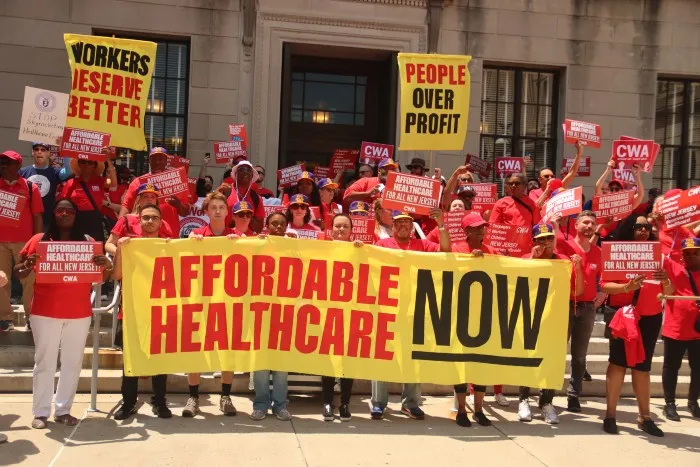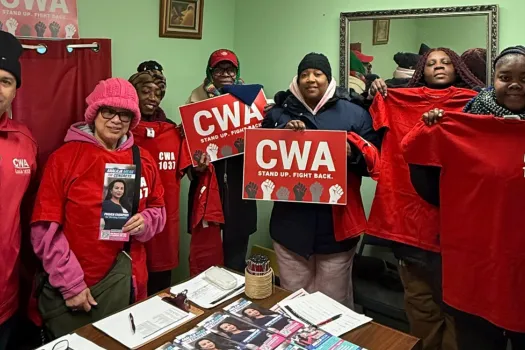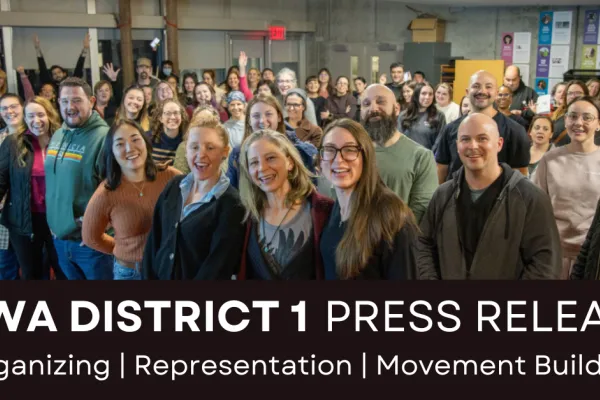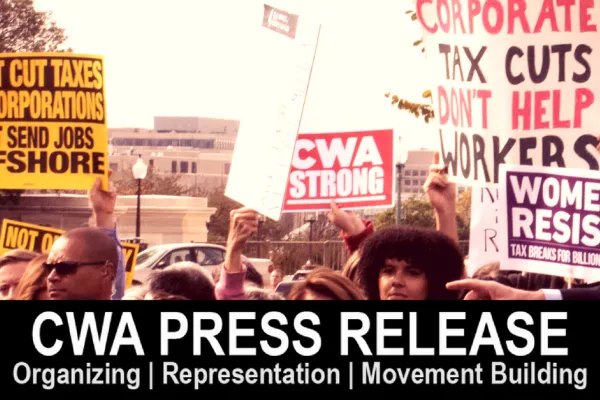Public Sector Workers Demand Fix to Healthcare Affordability Crisis

Contact: Moira Bulloch ([email protected]), CWA Communications, 202-434-1168
Public Sector Workers Demand Fix to Healthcare Affordability Crisis
TRENTON, N.J. – Thousands of public sector and State workers gathered at the New Jersey State House Annex today to deliver a message to state lawmakers to put a stop to skyrocketing healthcare costs for New Jersey’s public sector workforce.
Since 2022, healthcare premiums for State workers have increased by 40% while local government workers have seen a 59% compounded increase. The premium increases are putting a huge strain on workers and on the healthcare system itself, and is a key driver of the affordability crisis in New Jersey. A typical local government employee earning $65,000 is currently paying over $8,000 for a family plan. With the most recent increases in premiums, that same employee is paying almost $9,500 for that same plan in 2025, effectively eliminating any negotiated salary increase.
A coalition of labor unions, including the Communications Workers of America (CWA), the New Jersey State AFL-CIO, AFSCME NJ, AAUP-AFT, AFT New Jersey, The Council of New Jersey State Colleges, URA-AFT, HPAE, IFPTE and others are fighting for legislation to make healthcare more affordable, require fair pricing for healthcare services, and improve the governance and transparency of the State healthcare plan.
“New Jersey’s public sector workers keep our state running every single day, and they should not be punished with unaffordable healthcare costs,” said Dennis Trainor, CWA District 1 Vice President. “It’s time for lawmakers to take real action to rein in healthcare profiteering and deliver the affordability, transparency, and accountability that public workers—and all New Jerseyans—deserve.”
Public sector union workers are fighting for common-sense cost control and solutions like claims auditing, enforcing existing contracts with insurance carriers, and fair pricing that would rein in the costs of care overall, generating enormous savings for the State, local governments, and workers.
“What’s not to like about this proposal?” asked New Jersey State AFL-CIO President Charles Wowkanech. “It has produced massive savings in other states and could save New Jersey taxpayers $1.1 billion annually. It helps to control ever-increasing property taxes by slowing down out-of-control increases in health insurance premiums for public employees. It provides much-needed relief to workers who, during a time of historic inflation, are seeing every penny of their raises get eaten up by double-digit increases in health insurance premiums. Considering the dire condition of the State Health Benefits Plan, I urge the legislature to pass this bill now,” he concluded.
"When we say healthcare, we mean justice. I stand with my brothers and sisters because together, we can make healthcare affordable, accessible, and equitable for everyone,” said Assemblywoman Verlina Reynolds-Jackson (District 15). “No one should have to choose between getting treatment and paying the mortgage, the rent, or the light bill. That’s why I show up. That’s why I fight! Let's END Chapter 78 TOGETHER!"
“Healthcare costs in New Jersey have skyrocketed and proposed federal Medicaid cuts would rip away healthcare from hundreds of thousands of New Jerseyans—especially children, seniors, and people with disabilities,” said Assemblyman Cody Miller (District 4). “No one should have to choose between putting food on the table and paying for their medicine or doctor’s visit. That’s why we’re fighting to pass legislation that puts patients before profits. We can make New Jersey a leader in affordable, quality healthcare for every resident.”
“The ever-increasing healthcare costs have devastating financial and emotional effects for our members in the State Benefits Health Program. New Jersey’s working families deserve better. Reference-based pricing in healthcare will provide a fair-market standard that ensures transparency, cost-reduction, affordability, and quality health care,” said Susanna Tardi, Ph.D., the Executive Vice President of Higher Education, AFTNJ.
“The State needs to embrace the common-sense reforms that public sector unions have been offering for years,” said Steve Tully, AFSCME NJ Executive Director. “These reforms will ensure the long-term stability of the State Health Benefits Plan, while making healthcare more affordable for workers and the taxpayers.”
“Healthcare is a human right and New Jersey public workers need high-quality affordable coverage to safeguard our health and the rest of the state,” said Christine O’Connell, President of the Union of Rutgers Administrators-American Federation of Teachers, Local 1766. “Public workers have provided countless practical solutions to lower healthcare costs. These common-sense reforms are reflected in the legislative proposal we are calling for today, which is fair for workers, good for the public and will serve the state more efficiently and effectively than plans being developed by health insurance companies generating profit by denying preventative and necessary medical care.”
“Across New Jersey’s public colleges and universities, faculty—both full-time and part-time—dedicate themselves to the mission of higher education, often contingent workers putting in hours that match or exceed full-time roles. Yet too many are now forced to choose between keeping their healthcare and paying their bills. Premiums in the State Health Benefits Program have surged, putting enormous pressure on those who already qualify, while leaving others, like adjunct faculty, completely priced out of access," said Tom Raggio, Rutgers Adjunct Faculty Union. "Healthcare is not a luxury. It is a human right. This crisis exposes the broken structure of a system where workers who serve our students and institutions are either burdened by unaffordable costs or locked out entirely. We need bold reform—one that not only reins in rising premiums but ensures that all faculty, including adjuncts, are eligible for quality, affordable healthcare based on the work they do—not based on their ability to buy into the system at an unsustainable cost.”
“This legislation seeks to contain consumer pricing with no reduction in benefits, while increasing oversight and transparency at minimal cost to the state,” said HPAE President Debbie White. “It would help contain the spiraling costs of health insurance for our public workers.“
###
About CWA: The Communications Workers of America represents working people in telecommunications, customer service, media, airlines, health care, public service and education, manufacturing, tech, and other fields.
cwa-union.org @cwaunion
CWA CELEBRATES ANALILIA MEJIA’S HISTORIC PRIMARY VICTORY IN THE NJ-11 SPECIAL ELECTION
Nurses Win Union Election at Cayuga Medical Center, Expanding Labor Upsurge in NY Hospitals
More Nurses Join Union at Cayuga Health, Winning Voluntary Union Recognition


